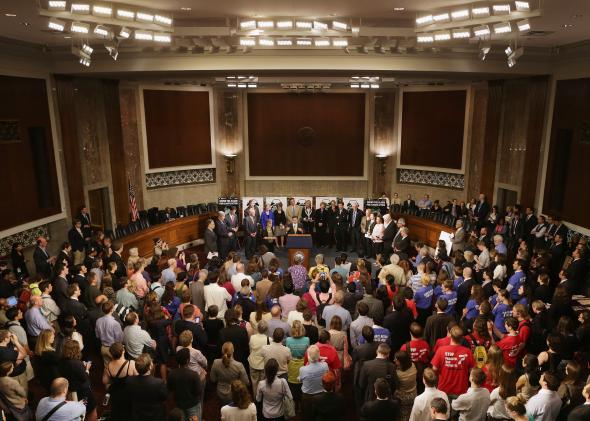The House Passes a Watered-Down NSA Reform Bill

Photo by Chip Somodevilla/Getty Images
Little more than a week ago, progressives and civil libertarians were quite satisfied with how they'd designed the USA Freedom Act. It escaped the Judiciary Committee with a ban on government data collection, and a requirement that new warrants—not just references to existing policy and warrants—be required to grab data from telecoms.
Then the Rules committee grabbed hold of the bill. The new problems were spotted quickly by the Electronic Frontier Foundation.
We are concerned with the new definition of "specific selection term," which describes and limits who or what the NSA is allowed to surveil. The new definition is incredibly more expansive than previous definitions. Less than a week ago, the definition was simply "a term used to uniquely describe a person, entity, or account.” While that definition was imperfect, the new version is far broader.1 The new version not only adds the undefined words "address" and "device," but makes the list of potential selection terms open-ended by using the term "such as." Congress has been clear that it wishes to end bulk collection, but given the government's history of twisted legal interpretations, this language can't be relied on to protect our freedoms.
Further, the bill does not sufficiently address Section 702 of the Foreign Intelligence Surveillance Amendments Act. We are specifically concerned that the new language references "about" searches, which collect and review messages of users who do not even communicate with surveillance targets.
Rep. Justin Amash, the libertarian Republican whose near-win on a data collection ban last year made the new bill impossible to ignore, announced before the vote that he was a "no."
This morning's bill maintains and codifies a large-scale, unconstitutional domestic spying program. It claims to end "bulk collection" of Americans' data only in a very technical sense: The bill prohibits the government from, for example, ordering a telephone company to turn over all its call records every day.
But the bill was so weakened in behind-the-scenes negotiations over the last week that the government still can order—without probable cause—a telephone company to turn over all call records for "area code 616" or for "phone calls made east of the Mississippi." The bill green-lights the government's massive data collection activities that sweep up Americans' records in violation of the Fourth Amendment.
But the bill had the bipartisan support to pass, and in the first stories about that passage, the concerns about the last-minute changes are relegated to the end of the nut grafs. The story is the House doing a thing.
